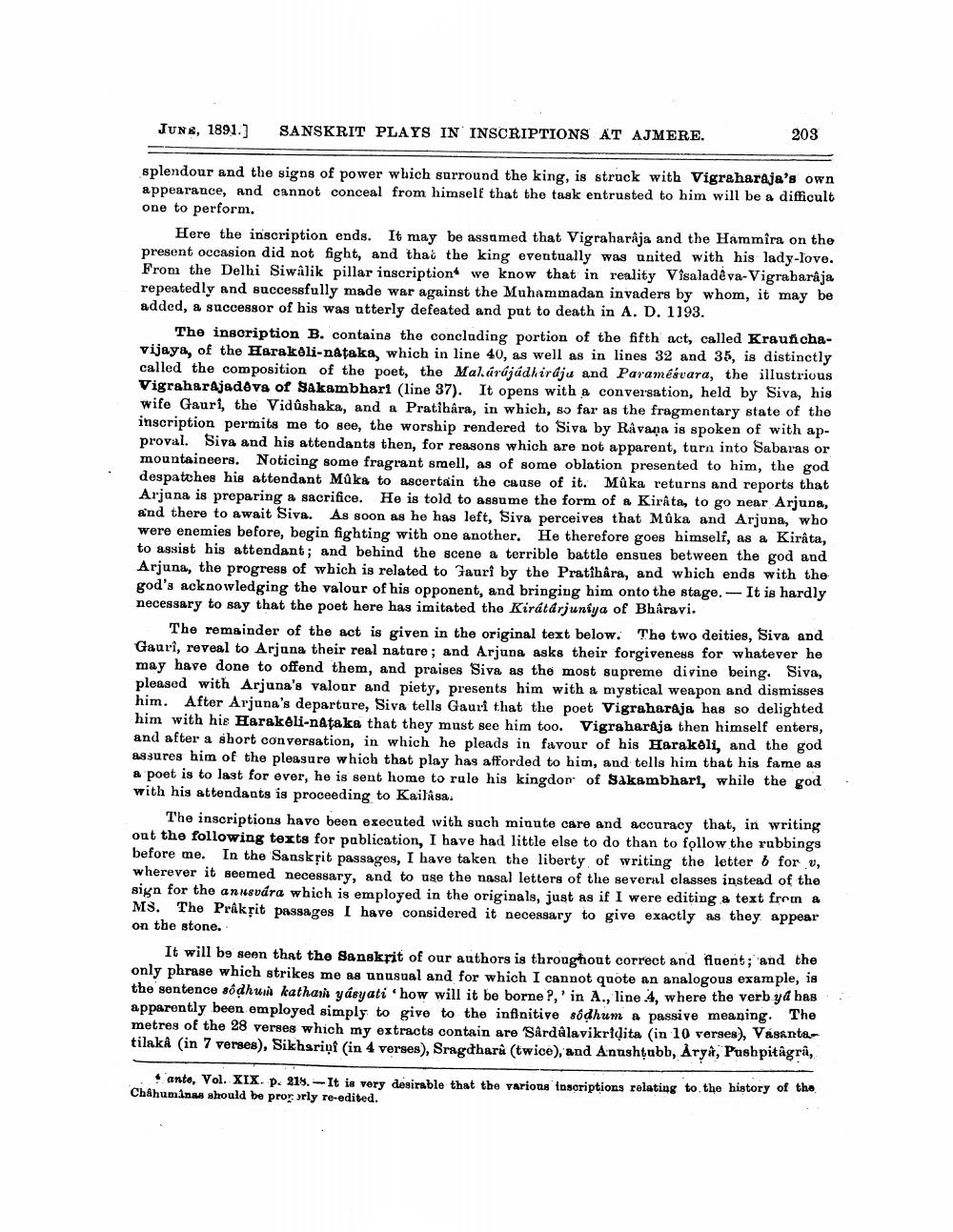________________
Jung, 1891.]
SANSKRIT PLAYS IN INSCRIPTIONS AT AJMERE.
203
splendour and the signs of power which surround the king, is struck with Vigraharaja's own appearance, and cannot conceal from himself that the task entrusted to him will be a difficult one to perform.
Here the inscription ends. It may be assumed that Vigraharaja and the Hammîra on the present occasion did not fight, and that the king eventually was united with his lady-love. From the Delhi Siwâlik pillar inscription we know that in reality Visaladêva-Vigrabarâja repeatedly and successfully made war against the Muhammadan invaders by whom, it may be added, a successor of his was utterly defeated and put to death in A. D. 1193.
The inscription B. contains the concluding portion of the fifth act, called Krauachavijaya, of the Harakoli-nataka, which in line 40, as well as in lines 32 and 35, is distinctly called the composition of the poet, the Malárújádhiraju and Paramésvara, the illustrious Vigraharajadêve of Sakambhari (line 37). It opens with a conversation, held by Siva, his wife Gauri, the Vidûshaka, and a Pratibâra, in which, so far as the fragmentary state of the inscription permits me to see, the worship rendered to Siva by Råvana is spoken of with approval. Siva and his attendants then, for reasons which are not apparent, turn into Sabaras or mountaineers. Noticing some fragrant smell, as of some oblation presented to him, the god despatches his attendant Muka to ascertain the cause of it. Mûka returns and reports that Arjana is preparing a sacrifice. He is told to assume the form of a Kirâta, to go near Arjuna, and there to await Siva. As soon as he has left, Siva perceives that Mûka and Arjuna, who were enemies before, begin fighting with one another. He therefore goes himself, as a Kirâta, to assist his attendant; and behind the scene a terrible battle ensues between the god and Arjuna, the progress of which is related to Lauri by the Pratîbâra, and which ends with the god's acknowledging the valour of his opponent, and bringing him onto the stage. - It is hardly necessary to say that the poet here has imitated the Kirátdrjunkya of Bharavi.
The remainder of the act is given in the original text below. The two deities, Siva and Gauri, reveal to Arjuna their real nature; and Arjuna asks their forgiveness for whatever he may have done to offend them, and praises Siva as the most supreme divine being. Siva, pleased with Arjuna's valour and piety, presents him with a mystical weapon and dismisses him. After Arjuna's departure, Siva tells Gauri that the poet Vigraharaja has so delighted him with his Harakeli-nataka that they must see him too. Vigraharaja then himself enters, and after a short conversation, in which he pleads in favour of his Harakali, and the god assures him of the pleasure which that play has afforded to him, and tells him that his fame as a poet is to last for ever, he is sent home to rule his kingdom of Sakambhari, while the god with his attendants is proceeding to Kailasa.
The inscriptions have been executed with such minute care and accuracy that, in writing out the following texts for publication, I have had little else to do than to follow the rubbings before me. In the Sanskrit passages, I have taken the liberty of writing the letter b for u, wherever it seemed necessary, and to use the nasal letters of the several classes instead of the sign for the anusvára which is employed in the originals, just as if I were editing a text from a MS. The Prakṣit passages I have considered it necessary to give exactly as they appear on the stone.
It will be seen that the Sanskrit of our authors is throughout correct and fluent; and the only phrase which strikes me as unusual and for which I cannot quote an analogous example, is the sentence sõdhu kathari yásyati how will it be borne ?,' in A., line .4, where the verb yd has apparently been employed simply to give to the infinitive sodhum a passive meaning. The metres of the 28 verses which my extracts contain are Sârdan lavikridita (in 10 verses), Vasantatilaků (in 7 verses), Sikhsriņi (in 4 verses), Sragdharà (twice), and Anushtubb, Arya, Pushpitágra,
tanto, Vol. XIX. p. 219. - It is very desirable that the various inscriptions relating to the history of the Chåhuminas should be pror arly re-edited.




